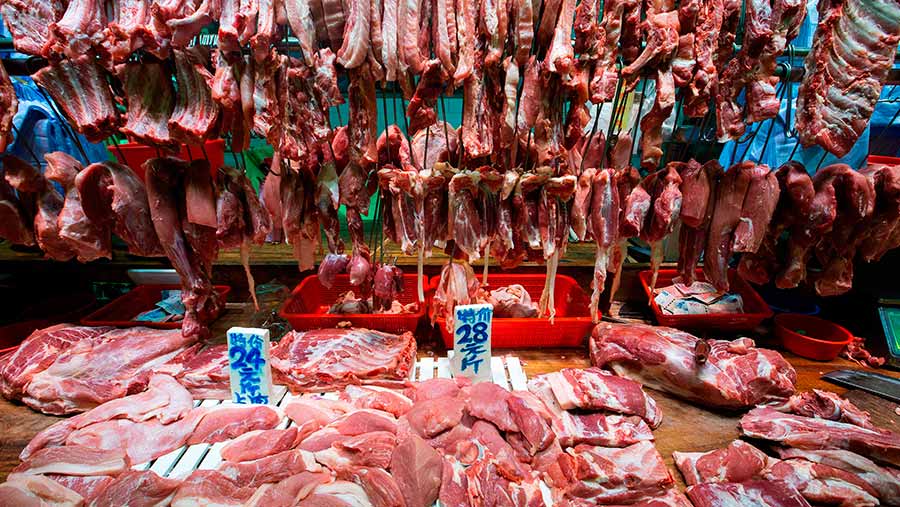Meat infected with African Swine Fever found in UK
 Pork on sale at a market in Hong Kong © Alex Hofford/EPA-EFE/Shutterstock
Pork on sale at a market in Hong Kong © Alex Hofford/EPA-EFE/Shutterstock Traces of African swine fever (ASF) have been found in meat products seized at airports in Northern Ireland.
The NI Department of Agriculture, Environment and Rural Affairs (Daera) said more than 300kg of illegal meat and dairy products were detected at airports in the country in June.
A sample of these seizures tested positive for DNA fragments of ASF at the Agri-Food and Biosciences Institute in Belfast.
Get the latest news about ASF and what you can do to prevent the virus entering your farm with the Pig Progress African Swine Fever information hub.More on African Swine Fever
While the discovery does not pose a risk to animal health status – or the disease-free status from ASF – it reinforces the importance of controls by Daera staff, the department said.
But Daera’s chief vet, Dr Robert Huey, warned that holidaymakers bringing in meat and dairy products could have a devastating impact on the UK’s agri-food industry.
“Imports of meat or meat products, milk and other dairy products are banned from most countries outside the EU,” he said.
Zoe Davies, chief executive of the National Pig Association (NPA), said the revelation highlighted just how vulnerable the UK pig herd was to ASF infection.
“We have always maintained that the biggest threat to the UK pig herd is from infected meat products that are illegally brought in from infected regions that then find their way into the UK pig herd or feral boar population,” Dr Davies said.
“It is therefore critical that we do everything in our powers to keep infection out of the country, including clear warnings at ports and airports that make the risks and penalties from bringing meat into the country clear to everyone, as well as more proactive surveillance and seizure of illegal meat imports.
“We also need to ensure, given that the virus might already be present in the country, that all pig keepers are aware of the risks of feeding meat and waste food to pigs, which is, of course, illegal.
“We are also encouraging producers to put up clear signage on footpaths and other areas of public access close to pig units warning the public not to feed pigs.”
The NPA has launched an industry-wide #MuckFreeTruck campaign to remind everyone across the supply chain as well as hauliers about the importance of ensuring trucks are clean and not carrying disease between sites.
Disease circulating
There are almost 6,000 ongoing cases of ASF across the world, according to the World Organisation for Animal Health (OIE).
Reports of African Swine Fever are circulating in continental Europe and Asia. At present, the disease continues to run rampant in China, with more than 130 outbreaks reported and more than one million pigs culled. The disease has also spread to Mongolia, Vietnam, Cambodia and Japan.
Defra has recently announced that it will be stepping up ASF controls at ports and airports, including a new poster campaign targeting travellers from ASF-affected regions, with warnings about bringing meat products into the country.
On-farm biosecurity measures to reduce ASF risk
- Allow only essential visitors on to your farm and insist that they wear clean or disposable clothing and footwear.
- Ensure all visitors wash their hands and, if possible, shower in.
- Allow vehicles and equipment on to the farm only if they have been cleaned and disinfected beforehand.
- Do not allow people who may have been in contact with other pigs on to your farm.
- Do not allow staff or visitors to bring any pork products on to the farm and do not allow catering waste or household scraps to be fed to pigs.
- Producers should source pigs and semen only with known health statuses.
Source: Ulster Farmers’ Union
